
Chernobyl or Chornobyl is a partially abandoned city in the Chernobyl Exclusion Zone, situated in the Vyshhorod Raion of northern Kyiv Oblast, Ukraine. Chernobyl is about 90 kilometres (60 mi) north of Kyiv, and 160 kilometres (100 mi) southwest of the Belarusian city of Gomel. Before its evacuation, the city had about 14,000 residents. While living anywhere within the Chernobyl Exclusion Zone is technically illegal today, authorities tolerate those who choose to live within some of the less irradiated areas, and an estimated 150 people live in Chernobyl in 2020.

Pripyat, also known as Prypiat, is an abandoned industrial city in Kyiv Oblast, Ukraine, located near the border with Belarus. Named after the nearby river, Pripyat, it was founded on 4 February 1970 as the ninth atomgrad to serve the nearby Chernobyl Nuclear Power Plant, which is located north of the abandoned city of Chernobyl, after which the power plant is named. Pripyat was officially proclaimed a city in 1979 and had grown to a population of 49,360 by the time it was evacuated on the afternoon of 27 April 1986, one day after the Chernobyl disaster.

The Chernobyl Nuclear Power Plant Zone of Alienation, also called the 30-Kilometre Zone or simply The Zone, was established shortly after the 1986 Chernobyl disaster in the Ukrainian SSR of the Soviet Union.

The Chernobyl Nuclear Power Plant (ChNPP) is a nuclear power plant undergoing decommissioning. ChNPP is located near the abandoned city of Pripyat in northern Ukraine, 16.5 kilometres (10 mi) northwest of the city of Chernobyl, 16 kilometres (10 mi) from the Belarus–Ukraine border, and about 100 kilometres (62 mi) north of Kyiv. The plant was cooled by an engineered pond, fed by the Pripyat River about 5 kilometres (3 mi) northwest from its juncture with the Dnieper River.

The Chernobyl disaster began on 26 April 1986 with the explosion of the No. 4 reactor of the Chernobyl Nuclear Power Plant near the city of Pripyat in northern Ukraine, near the Belarus border in the Soviet Union. It is one of only two nuclear energy accidents rated at the maximum severity on the International Nuclear Event Scale, the other being the 2011 Fukushima nuclear accident. The response involved more than 500,000 personnel and cost an estimated 18 billion rubles. It remains the worst nuclear disaster in history, and the costliest disaster in human history, with an estimated cost of $700 billion USD.

The Chernobyl disaster is the world's worst nuclear accident to date.

Slavutych is a city and municipality in northern Ukraine, purpose-built for the evacuated personnel of the Chernobyl Nuclear Power Plant after the 1986 disaster that occurred near the city of Pripyat. Geographically located within Chernihiv Raion, Chernihiv Oblast, Slavutych is administratively subordinated to the Kyiv Oblast and is part of Vyshhorod Raion. It is coterminous with Slavutych urban hromada, one of the hromadas of Ukraine. In 2021 the city had a population of 24,464.

Anatoly Stepanovich Dyatlov was a Soviet engineer who was the deputy chief engineer for the Chernobyl Nuclear Power Plant. He supervised the safety test which resulted in the 1986 Chernobyl disaster, for which he served time in prison as he was blamed for not following the safety protocols. He was released due to health concerns in 1990. Later investigations found that reactor design flaws were a more significant factor than human error. However, some safety procedures were not followed and may have also affected the disaster.

The Polissya hotel is one of the tallest buildings in the abandoned city of Pripyat, Ukraine. It was built in the mid-1970s to house delegations and guests visiting the Chernobyl Nuclear Power Plant. Currently, the hotel is half-ruined. As of 2021, a section of the hotel's roof has become noticeably unstable, sparking concerns of a potential collapse.

Lyubov Makarivna Sirota is a Ukrainian poet, writer, playwright, journalist and translator. As a former inhabitant of the city of Pripyat and an eyewitness of the Chernobyl disaster, she has devoted a great part of her creative output to the 1986 catastrophe. She writes in both Ukrainian and Russian, and also translates from Ukrainian into Russian and vice versa. Her poems have been translated into many languages, including English.

Alexander Yukhymovych Sirota is a Ukrainian photographer, journalist, filmmaker. He writes in Russian and Ukrainian. As a former resident of Pripyat, he is an eyewitness and a victim of the 1986 Chernobyl disaster. He has devoted many articles, photographs, and video reports to the city of Pripyat and to the Chernobyl catastrophe. He is the editor-in-chief of the internet project "pripyat.com" and the president of the International Public Organization "Center Pripyat.com". In May 2008, he became the winner of the ІХ-th international competition "Golden George" of films, TV-programs, and internet projects about protective law and law enforcement. In that competition, Alexander won "The Big Tape of George" award for his website devoted to Chernobyl. He is a member of the Union of Journalists of Ukraine since 2008 and a member if International Federation of Journalists.
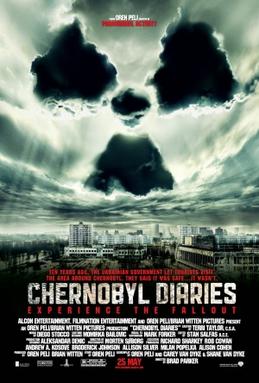
Chernobyl Diaries is a 2012 American found footage horror thriller film co-written and produced by Oren Peli and directed by Brad Parker, in his directorial debut. The film stars Jonathan Sadowski, Jesse McCartney, Devin Kelley, Olivia Taylor Dudley, Ingrid Bolsø Berdal, Nathan Phillips, and Dimitri Diatchenko, and was shot on locations in Pripyat, Ukraine, as well as Hungary, and Serbia.
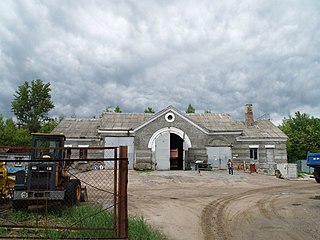
Yaniv is an abandoned village in Vyshhorod Raion, Kyiv Oblast, northern Ukraine. It is located south of Pripyat and west of the Chernobyl Nuclear Power Plant.

The Chernihiv–Ovruch railway is a partially electrified and partially operational single track railway line that stretches between the town of Ovruch and the city of Chernihiv, in northern Ukraine, passing through southern Belarus and the Chernobyl Exclusion Zone. The line is owned by Ukrzaliznytsia alone, with railway stations located in Belarus being leased from the government of Belarus. A portion of the line between railway stations Vilcha and Semykhody has not been in service since the Chernobyl disaster, on 26 April 1986.
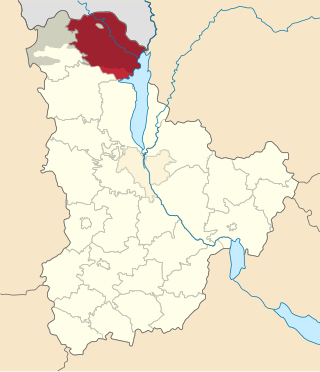
Chernobyl Raion or Chornobyl Raion was a raion in the Soviet Union located in the Ukrainian Soviet Socialist Republic. It was one of 26 administrative raions (districts) of Kyiv Oblast in northern Ukraine. After the Chernobyl disaster, the majority of the raion was contaminated, and many of its populated places were included into the Chernobyl Exclusion Zone, which is an officially designated exclusion area around the site of the disaster.

The Palace of Culture Energetik is an abandoned palace of culture located in the town of Pripyat, at the Chernobyl Exclusion Zone in Ukraine.

The Chernobyl disaster remains the major and most detrimental nuclear catastrophe which completely altered the radioactive background of the Northern Hemisphere. It happened in April 1986 on the territory of the former Soviet Union. The catastrophe led to the increase of radiation in nearly one million times in some parts of Europe and North America compared to the pre-disaster state. Air, water, soils, vegetation and animals were contaminated to a varying degree. Apart from Ukraine and Belarus as the worst hit areas, adversely affected countries included Russia, Austria, Finland and Sweden. The full impact on the aquatic systems, including primarily adjacent valleys of Pripyat river and Dnieper river, are still unexplored.
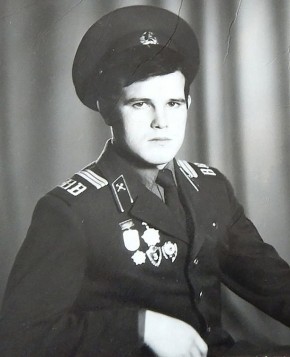
Vasily Ivanovich Ignatenko was a Soviet firefighter who was among the first responders to the Chernobyl disaster. He worked as an electrician before being conscripted into the Soviet Armed Forces in 1980, where he completed his two years of service as a military firefighter. Afterwards, he took up employment as a paramilitary firefighter with Fire Brigade No. 6, which was based out of Pripyat. On 26 April 1986, Ignatenko's fire brigade was involved in mitigating the immediate aftermath of the Chernobyl disaster; fighting the fires that broke out following the initial explosion of Reactor 4 at the Chernobyl Nuclear Power Plant. While on site, Ignatenko received a high dose of radiation, leading to his death at a radiological hospital in Moscow eighteen days later.
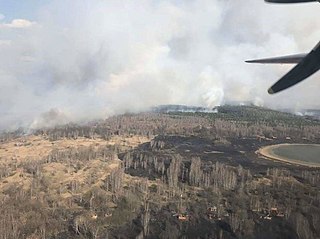
The 2020 Chernobyl Exclusion Zone wildfires were a series of wildfires that began burning inside Ukraine's Chernobyl Exclusion Zone in April 2020. The fires were largely extinguished within two weeks. At least one suspect was arrested for alleged arson.

During the Russian invasion of Ukraine, the Chernobyl Exclusion Zone was captured on 24 February 2022, the first day of the invasion, by the Russian Armed Forces, who entered Ukrainian territory from neighbouring Belarus and seized the entire area of the Chernobyl Nuclear Power Plant by the end of that day. On 7 March, it was reported that around 300 people were trapped and had been unable to leave the power plant since its capture. On 31 March, it was reported that most of the Russian troops occupying the area had withdrawn, as the Russian military abandoned the Kyiv offensive to focus on operations in Eastern Ukraine.


















